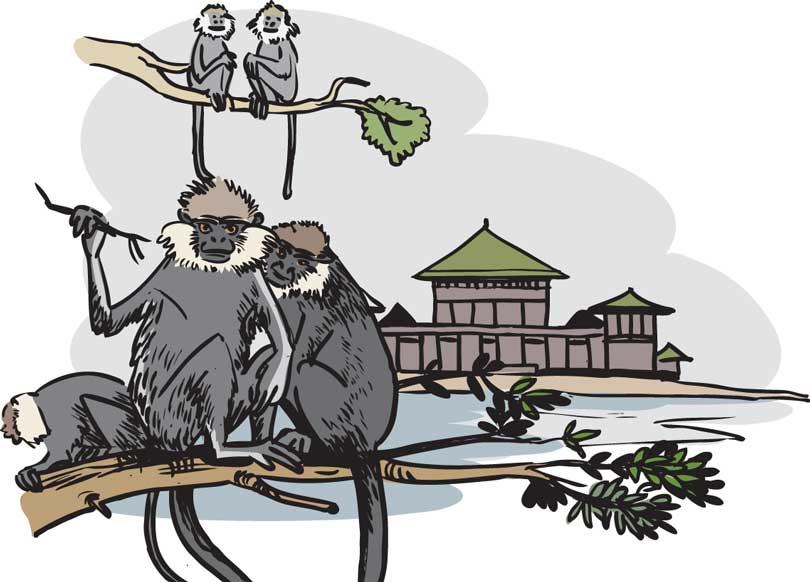Reply To:
Name - Reply Comment

Monkeys are superior to men in this: when a monkey looks into a mirror, he sees a monkey - Malcolm De Chazal
For years people who live in the lower end of Sri Nanda Jotikarama Road, Thalawathugoda, just 2 km South-East of parliament have got used to a relatively unique wake up call.
The call made by waking up monkeys who have for long made the little forested areas down the road their habitat. Their call that is usually heard between 5.30 a.m. to 6.15 a.m. brings a smile to the residents in the neighbourhood.
After all not everyone in the administrative capital of the country is privileged to be woken up by the calls of monkeys, especially in an area that is getting so populated.
Besides these primates are not the common small brown monkeys that inhabit popular pilgrim sites. These are the big grey monkeys with a shade of purple on their hair on head and beard – known as the purple-faced langur or purple-faced leaf monkey. Endemic to Sri Lanka they belong to the category of old species of monkeys.
Occasionally, especially on the weekends, these monkeys run along the parapet walls of the nearby houses and can even be seen using powerlines to cross over to their ranges. Interestingly despite these movements there had never been any complaints of them attacking people.
However, Thalawathugoda is not the only area in the neighbourhood of Parliament where one can find the purple faced langur. They also inhabit the area across the waters of the Waters Edge complex - Kalapaluwawa with Tapovana monastery as their base.
The unavailability of tall trees like rubber, coconut and tree canopies must be making these intelligent mammals feel too exposed in the wetland mostly covered with grass and shrubs.
However with both Thalawathugoda and Kalapaluwawa becoming fast developing areas with shrinking woods these old inhabitants are now faced with loss of habitats.
The Ministry of Megapolis and Western Development has planted fruit trees in Diyasaru Park, the wetland across Parliament for the consumption of the monkeys, birds and squirrels. However, the Ministry maintains that the monkeys in the neighbourhood are yet to come to the park probably due to lack of connecting corridors as they have to cross the ever-expanding Thalawathugoda town to visit the park.
Besides the unavailability of tall trees like rubber, coconut and tree canopies must be making these intelligent mammals feel too exposed in the wetland mostly covered with grass and shrubs. The ministry also maintains that the growing urbanization has resulted in change of food habits of these monkeys.
Having fed on bread and other bakery products for some time they no longer crave for fruits as they used to, the ministry observes.
While the animals may still find food thanks to generous neighbours, they are however unlikely to survive in the respective areas with shrinking wood. As long as Tapovana monastery exists the monkeys that inhabit the area are likely to hang around there though there’s hardly any woodland other than that in the vicinity.
On the other hand the future of Thalawathugoda monkeys is certainly in dire straits as of now. The thicket which is the last habitat of the monkeys down Sri Nanda Jothikarama road is being cleared right now to build houses. One wonders where the occupants would go once it is completely cleared. Perhaps it’s a matter of days that the neighbours hear the last wakeup call by these fellow primates.